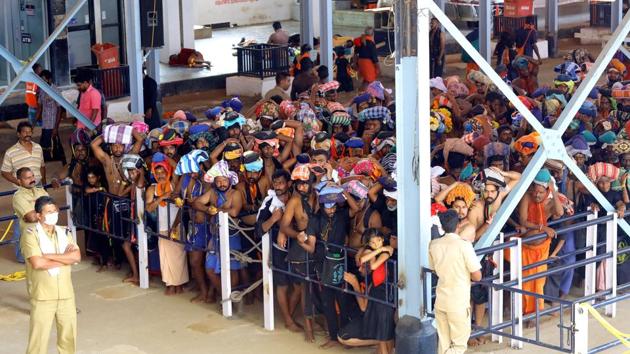Sabarimala bench to rule on constitutional questions only, says CJI Bobde
The nine-judge bench was constituted after a November 14 judgment of a five-judge bench heard the review petitions challenging a September 2018 judgment of the Supreme Court throwing open the Sabarimala temple to all women irrespective of their age.
Chief Justice of India (CJI) SA Bobde on Monday cleared the air surrounding the objective of the nine-judge bench constituted to hear the case concerning the entry of women into the Sabarimala temple, saying that the bench will decide only the constitutional questions referred to it by the five-judge bench in November 2019 and not the review plea against the 2018 judgment of the top court.

The judgment, which allowed women of all ages to enter the Sabarimala temple, led to tension, even violence in Kerala as several women were stopped by angry mobs from entering the hilltop shrine on the grounds that it hurt religious sentiments. It also led to a political slugfest, with the Left government in the state on one side and both the Congress and the Bharatiya Janata Party (BJP) on another.
“We are not hearing review petitions, we are only hearing the seven questions referred to larger bench by the five-judge bench,” the CJI said.
The bench, which also comprises justices R Banumathi, Ashok Bhushan, L Nageswara Rao, Mohan M Shantanagoudar, S Abdul Nazeer, R Subhash Reddy, BR Gavai and Surya Kant, asked the parties to the case to reframe the issues to be taken up by the nine-judge bench within three weeks. The lawyers for the parties, the court said, have to meet on January 17 in the presence of Secretary General of the Supreme Court to undertake the exercise of reframing the issues.
The nine-judge bench was constituted after a November 14 judgment of a five-judge bench heard the review petitions challenging a September 2018 judgment of the Supreme Court throwing open the Sabarimala temple to all women irrespective of their age.
The court in its November 14, 2019 judgment observed that practices entailing restriction on entry of women in places of worship, and other religious practices that affect women were not limited to the Sabarimala case, but also arose in respect of three other cases pending before the Supreme Court. One was on entry of Muslim women in a durgah/mosque, and another case was about the entry of Parsi women married to non-Parsi men into the holy fire place of an Agyari. The third case, the court noted, was regarding the practice of female genital mutilation among the Dawoodi Bohra community.
The court said that the issues concerning women’s rights vis-à-vis religious practices require consideration by a larger bench of not less than seven judges so as to ensure that a judicial policy is evolved to do substantial and complete justice. The court also framed seven questions to be decided by the larger bench, stating that the review petitions should be decided only after the larger legal issues are settled.
The Supreme Court then constituted a nine-judge bench to hear the case.
When the matter was taken up on Monday, senior advocate Abhishek Manu Singhvi, appearing for Prayar Gopalakrishnan, former president of the Travancore Devaswom Board (the government body which administers temples in Kerala), told the court that the issues framed by the five-judge bench last November were too “broad” and should be reframed so that the nine-judge bench can focus the hearing on the relevant aspects. Singhvi also sought time to reframe the issues.
The bench agreed, and also took a leaf out of the Ayodhya title case, asking the parties to decide the specific issues which each counsel will argue, and the time each counsel will take for arguments.
“Senior advocates Rajeev Dhavan and Vaidyanathan had done a great job of this in the Ayodhya matter, and we must follow suit,” the CJI said.
The exercise of framing issues has to be completed within three weeks. The court also said that it will only consider the issues referred to in November 19 judgment, and will not go into individual facts of any of the cases.
The top court, in its 2018 judgment, struck down Rule 3(b) of the Kerala Hindu Places of Public Worship (Authorisation of Entry) Rules, 1965,which was the basis for barring entry of women between the ages of 10 and 50 years into Sabarimala. Several devotees believe that since Lord Ayappa is a celibate, women between the ages of 10 and 50 should not enter the temple.
Subsequently, at least 60 review petitions were filed challenging the September 2018 verdict, which was heard by the five-judge bench in open court before it delivered its verdict on November 14 last year, framing seven questions to be considered by a bench of not less than seven judges.
“I think it is a very positive step by the bench to allow the parties to reframe the issue. Parties were not completely satisfied by the reference order since many of the parties felt that there were more questions of constitutional importance that should have been formulated by the 5-judge bench. The issues involved in the case will have a bearing on large number of other petitions and issues,” advocate KV Muthukumar, representing one of the review petitioners, NGO Chetana Conscience of Women, said.
.






